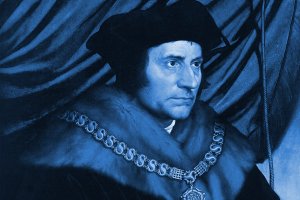

Some Saintly Advice for Catholic Politicians
by John Davis
|
Perhaps the best rebuttal to those pro-abortion "Catholic" politicians in Washington and the statehouses who argue it is their duty to represent all their constituents and not vote or act on legislation based on their own personal beliefs — which reportedly mirror Church doctrine condemning the killing of the unborn — are the words uttered by the 16th century English statesman, St. Thomas More.
As a Knight and member of the King's Council in 1527, More faced his own moral dilemma. King Henry VIII desperately wanted the highly regarded Sir Thomas's support for his appeal to the Pope to grant him a divorce from Katherine of Aragon so he could marry his mistress Anne Boleyn. A fervent Catholic, More refused to give his support based on the Church's teaching of the indissolubility of marriage.
As the 1966 movie, "A Man For All Seasons," depicts, two years before ascending to the position of Lord Chancellor (as the first layman to hold the post), More, played by Paul Scofield, is drilled by his predecessor, Cardinal Wolsey (Orson Welles) regarding his lack of support for the King's divorce: "Explain how you as a councilor of England can obstruct these measures for the sake of your own private conscience?"
More responds point blank to Wolsey: "I think that when statesmen forsake their own private conscience for the sake of their public duties, they lead their country by a short route to chaos."
Who today could argue America has not been descending that very road to chaos ever since the 1973 Supreme Court ruling legalizing abortion in all 50 states? Now Republican and Democratic politicians alike are beholden to the abortion lobby in order to win election or reelection. Republican governors Pataki in New York and Schwarzenegger in California defend a woman's right to an abortion despite their Catholic faith. Democratic presidential candidate John Kerry, an avowed Catholic, is among the Senate elite who voted to maintain the legality of partial birth abortion despite his church's condemnation of infanticide.
Clearly these Catholic politicians have elevated the goal of getting elected above their solemn duty to defend the Faith and the most vulnerable in society. The Catechism of the Catholic Church states: "God, the Lord of life, has entrusted to men the noble mission of safeguarding life, and men must carry it out in a manner worthy of themselves. Life must be protected with the utmost care from the moment of conception: abortion and infanticide are abominable crimes."
Hopeful signs, though, amid this moral chaos are the recent proclamations of a handful of Catholic bishops warning Catholic politicians who support legalized abortion not to present themselves for Holy Communion. Indeed, these clergy are simply complying with their church's own Canon Law, which mandates the denial of Communion to all "manifest, obstinate, persistent sinners." These few stalwart shepherds are finally realizing that by not speaking out, they are imperiling the immortal souls of their flocks — as well as their own.
After being found guilty of treason, Sir Thomas More was beheaded on July 6, 1535. His crime was his refusal to recognize the King as the self-proclaimed supreme head of the church in England. Reportedly, among More's few final words on the scaffold were that he died "the King's good servant, but God's first."
In 1886 Pope Leo XIII beatified Thomas More with 53 other martyrs. In 1935 Pius XI canonized him on the fourth centenary of his martyrdom. In 1929, G.K. Chesterton remarked in an address that, "Blessed Thomas More is more important at this moment than at any moment since his death, even perhaps the great moment of his dying; but he is not quite so important as he will be in about a hundred years' time."
On October 31, 2000, Pope John Paul II proclaimed St. Thomas More the "patron saint of government officials and politicians." In his apostolic letter, Pope John remarked on the need for such a patron saint at a time when "scientific achievements in the area of biotechnology underline the need to defend human life at all its different stages." St. Thomas More provides such a role model, as the papal epistle proclaims: "Whenever men or women heed the call of truth, their conscience then guides their actions reliably towards good. Precisely because of the witness he bore, even at the price of his life, to the primacy of truth over power, Saint Thomas More is venerated as an imperishable example of moral integrity. And even outside the Church, among those with responsibility for the destinies of peoples, he is acknowledged as a source of inspiration for a political system which has as its supreme goal the service of the human person."
If only more of today's Catholic politicians would pay heed to the sterling example set by their patron saint.


